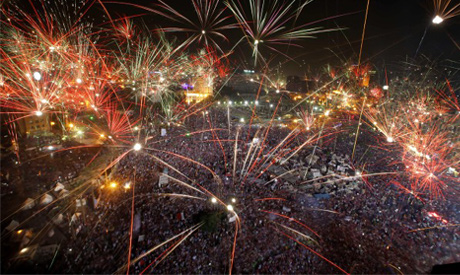
Fireworks light the sky opponents of Egypt's Islamist President Mohammed Morsi celebrate in Tahrir Square in Cairo, Egypt, Wednesday, July 3, 2013 (Photo: AP)
Israel maintained a worried silence on Thursday following the overthrow of Egypt's first democratically-elected president, Mohammed Morsi by the Egyptian army.
Government officials, who are normally quick to comment on regional developments, maintained an unusual silence after Prime Minister Benjamin Netanyahu ordered his cabinet to hold their silence on the crisis, press reports said.
One official, speaking on condition of anonymity, said Israel was watching carefully to see how the situation would develop.
"The government is closely monitoring the situation in Egypt but is not making any predictions because things are still developing," he told AFP.
"It is important that the Egyptian people can enjoy a new level of freedom and self-determination ... but the current situation has sent shock waves throughout the Arab world and it is causing some concern in Israel," he said.
"Israel is being careful to avoid even the appearance of interference with events in Egypt," wrote Amos Harel in Haaretz newspaper.
Israel and Egypt signed a peace treaty in 1979, and since then, their two armies have maintained a good working relationship, despite slightly chilly ties at the political level.
Although there was no immediate security implications for Israel, pundits said the main concern was that Islamic groups in Sinai could take advantage of the chaos to stage attacks along the Israeli border.
"There is great uncertainty over Egypt's future and it is very difficult for Egypt, which is caught up with internal issues, to deal with security problems, notably from terror groups in Sinai," an Israeli official told army radio, speaking on condition of anonymity.
Since former Egyptian president Hosni Mubarak was ousted in February 2011, a wave of lawlessness has spread across the Sinai Peninsula, but under Morsi, the army had made determined efforts to clamp down on the chaos, and had also worked to destroy the smuggling tunnels between Gaza and Sinai, pundits noted.
Short link: